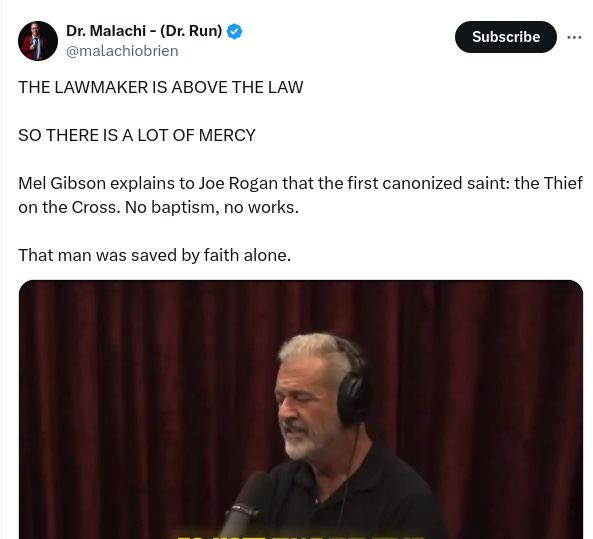At first glance, a clip of Mel Gibson’s interview with Joe Rogan might give the impression that he understands the gospel. With calm confidence, he drops theological references like a man holding court at a coffee shop Bible study.
“To note that the first canonized saint, you know who it was?” he asks Rogan, who, predictably, has no idea. “Dismas. You know who Dismas was? He was the thief on the cross next to Jesus.”
For a fleeting moment, Gibson seems to be walking a solid theological line, acknowledging that the thief on the cross—this supposed “Dismas”—was saved without baptism, without works. But scratch the surface of Gibson’s commentary, and what’s revealed is a theological wasteland as riddled with error as any apocryphal text he clearly prefers over Scripture.
Let’s start with the obvious, the name "Dismas." Where does Gibson even get that? Certainly not from the Bible, which never once names the thief. Instead, the name comes from the Gospel of Nicodemus, a pseudo-canonical text cherished in Roman Catholic tradition but rejected by Protestants or any who care about the authority of Scripture.
Gibson parrots Catholic lore, holding up this fictional name as though it adds gravity to his point. It doesn’t. It simply reveals his reliance on the traditions of men rather than the inerrant Word of God.
Worse yet, he calls this unnamed thief the “first canonized saint.” The very concept of canonization is nothing more than a man-made Catholic construct—an ecclesiastical pat on the back that has zero basis in Scripture. The real question isn’t why Gibson repeats such nonsense—it’s why anyone, like Southern Baptist pastor Malachi O’Brien, listens to it without stopping to ask, “Where is that in the Bible?”
But Gibson’s theological catastrophe doesn’t end with Dismas. It’s his explanation of the thief’s salvation that truly ventures into unholy territory. He acknowledges—correctly, at first—that the thief on the cross was saved apart from baptism or works. But then he ventures into extremely dangerous theological territory, claiming,
“The lawmaker is above the law.”
And there it is. With that one statement, Gibson sets fire to the gospel and lets it burn, all while smiling and nodding as though he’s said something profound.






